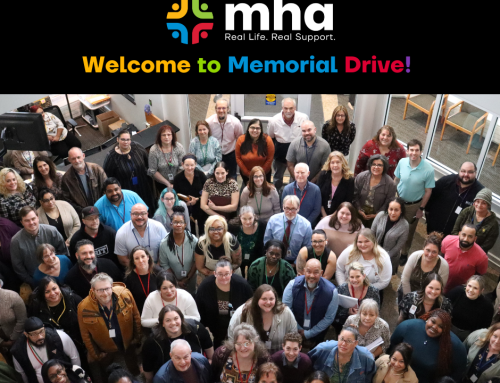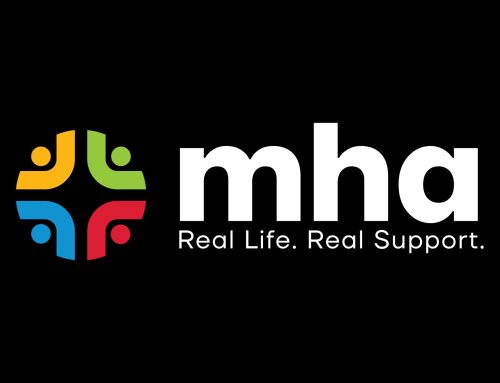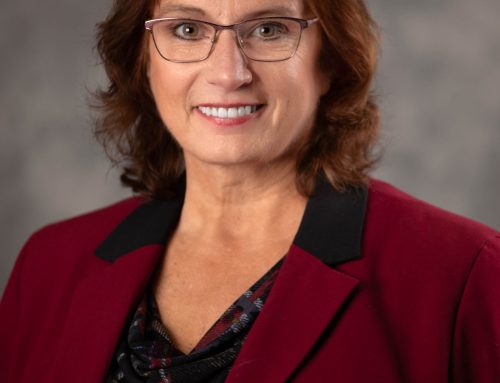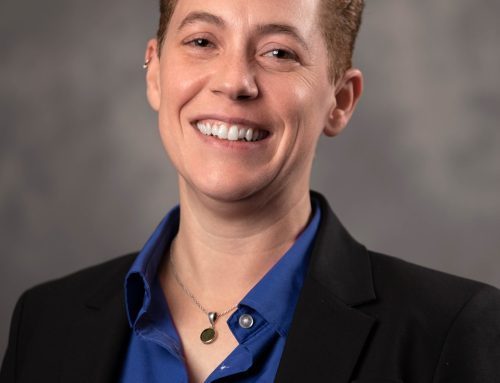
The best way to introduce MHA employee Odelle Williams is through the type of direct care she gives as a Residential Specialist in the New Way Division for individuals impaired by an acquired brain injury.
“I was helping give a shower to one of the participants and he said to me, you clean my feet so good, and I said this is how I used to clean my grandmother’s feet,” she shared. “A lot of the care that I have given my own family, I tend to give the same way to the participants. It comes natural.”
The theme for this March’s Brain Injury Awareness Month is “More Than My Brain Injury,” something the 45-year-old Springfield resident sees firsthand in the response she gets to the assistance she gives as a “natural-born helper” to those in her care at MHA.
Two of the five individuals in the residence where Odelle works are wheel-chair bound and self-movement for one is limited to an arm and hand but all she said strive for maximum independence while living with a sudden, severe injury to their brain and what it controls that completely changed their lives.
“I knew my work with MHA was going to be challenging, and I like a challenge,” Odelle said. “I don’t run from it. What makes me feel good inside as a caregiver is to help people who are willing to help themselves. Their motivation to get up and make the best of each day is where a lot of my motivation comes from as a caregiver. The individuals I assist like the assist, but they are willing to do what they need to do for themselves.”
Odelle assists with personal care which may mean helping one resident dry off and dress after a shower and another with the lift for getting out of bed. Patience and understanding, she said, are built into the assistance that she delivers to members ranging in age from mid-30s upward.
“One of my residents does struggle to communicate, and sometimes I will go closer and say, ‘Can you say that one more time,’ and at that point I am usually able to catch it,” Odelle said. “You have to be patient and not make someone feel like they need to rush.”
She said that “If anyone wants to talk, I will listen attentively to what they want to talk about.”
“You can almost tell by facial expressions if someone is not in a good mood,” Odelle said. “I will try to offer understanding if, for example, someone is angry about being there and not with their family. I will reassure them that their family loves them and that we care and are going to do the best we can by them. I listen, I reason, and I hope my attitude in this way improves upon their attitude and with whatever the issue is at that moment with them. It usually does help someone calm themselves.”
Odelle, who does the grocery shopping for the residence and usually makes the evening meal, added residents enjoy being out in the community as well as weighing in on their meal choices.
“I get a lot of special requests and I try to fit that into their budget,” Odelle said. “Everyone loves tacos and recently our Italian night has featured lasagna or stuffed shells instead of spaghetti with the traditional meat sauce. We have also stepped it up lately with a nice roast and potatoes. We have participants of different ages, and the meal requests tend to reflect what they would eat if they were in the community still for themselves.”
Odelle cared for her grandmother over a 13-year period until the woman’s death last year at age 90, and another family member with mental health conditions. She calls her five children, who range in age from 10 through 25, “beautiful.” The oldest earned a business degree from Westfield State University, works now as an accountant in Georgia and is preparing his 18-year-old brother to join him there.
“I am really happy at the progress my own children are making and through me having my own children that natural nurturing comes out,” Odelle said. “We work together as a family. They are really doing what they need to do for themselves and that makes me happy as I know I have done what I needed to do as a mother for them.”
Odelle said she likes the fact MHA provides lots of in-service days and calls “really beneficial” the regular meetings staff and clinicians have with direct care workers to keep them updated on those they assist.
“They keep us in the loop of what we need to do to provide the best care we can to the participants,” Odelle said. “MHA treats everyone as an individual and meets everybody’s needs as an individual and that is important.”
She calls herself a “spiritual person” and one grateful for where she is in life.
“I believe in God and I know that we are all here for a reason and that different things happen to us for a reason and we have to make the best out of each day that we are given,” Odelle said. “I have been working for MHA for almost a year, and I am really glad I was given the opportunity. It has been a good experience and I look forward to many more years being with the residents here that I assist.”
